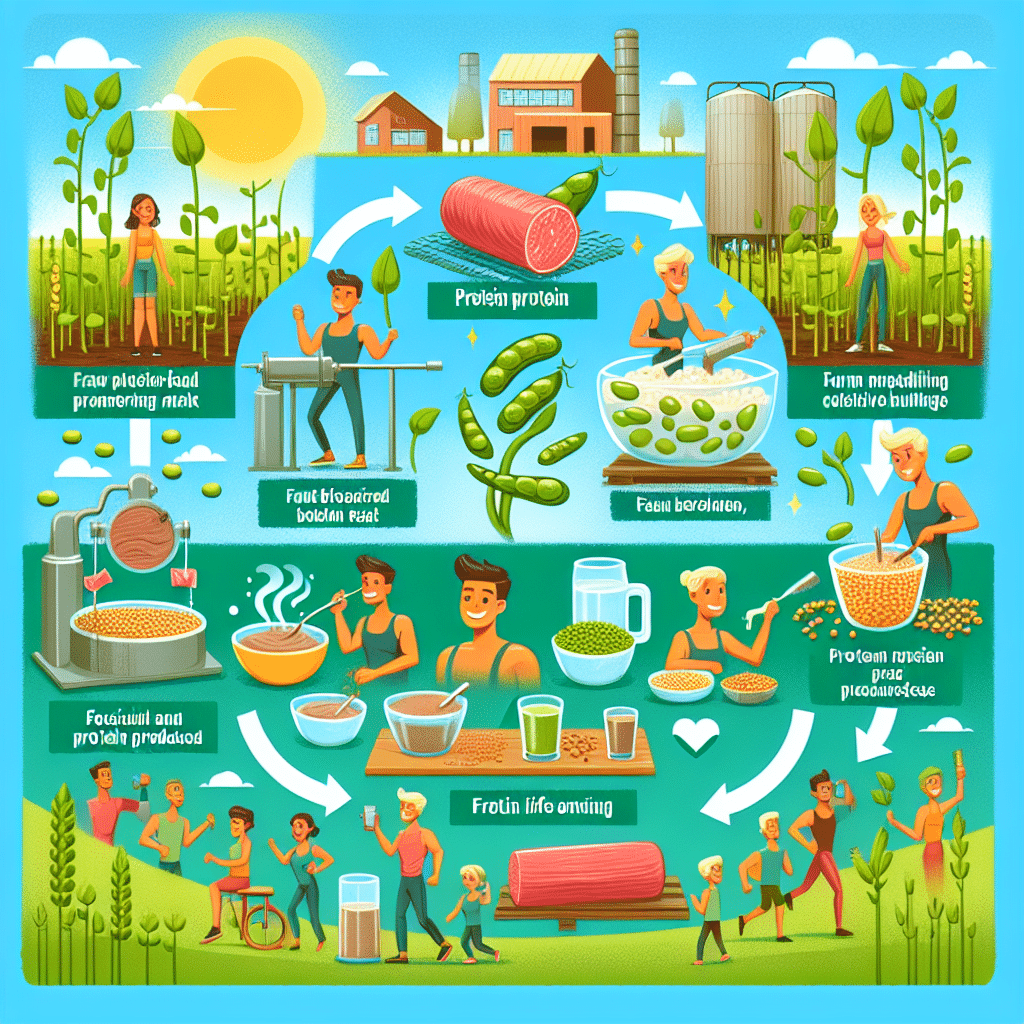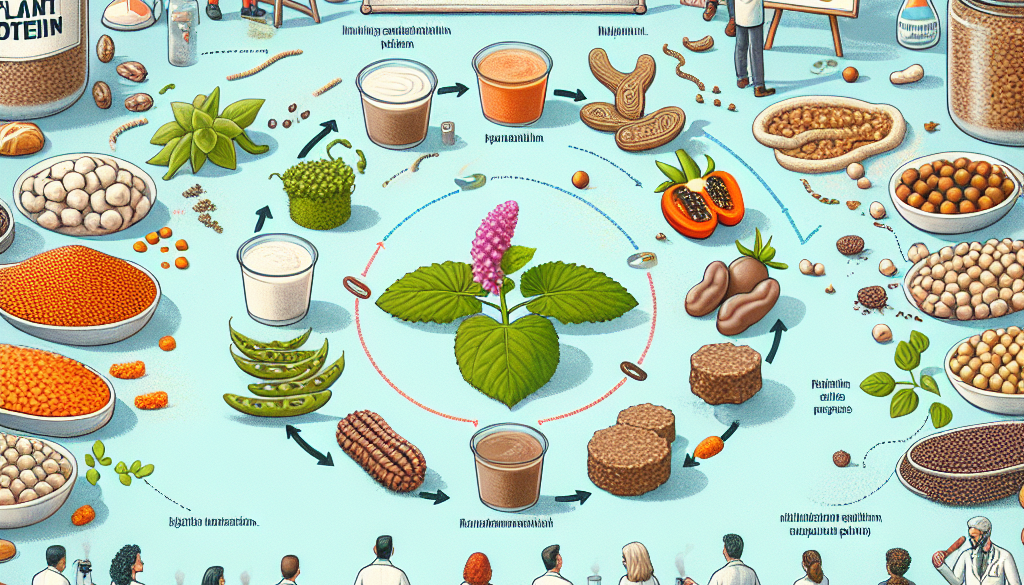Unlocking Plant Protein Potential: How to Reinvent Plant Protein to Boost Consumer Adoption
-
Table of Contents
- Plant Protein Potential: Boosting Consumer Adoption
- Understanding the Hesitancy Towards Plant Proteins
- Enhancing Taste and Texture
- Improving Nutritional Profile
- Marketing and Education
- Price Parity and Accessibility
- Statistics Supporting Plant Protein Growth
- Case Studies of Successful Plant Protein Adoption
- Conclusion: Key Takeaways for Unlocking Plant Protein Potential
- Discover ETprotein’s High-Quality Plant Proteins
Plant Protein Potential: Boosting Consumer Adoption

The global shift towards plant-based diets is not just a fleeting trend but a significant movement driven by concerns for health, the environment, and animal welfare. As the demand for plant-based alternatives grows, the plant protein market is poised to expand. However, despite the potential, consumer adoption of plant proteins is still facing challenges. This article delves into strategies for reinventing plant protein to enhance its appeal and encourage widespread consumer adoption.
Understanding the Hesitancy Towards Plant Proteins
Before we can unlock the potential of plant proteins, it’s crucial to understand the barriers to their adoption. Some consumers are skeptical about the taste, texture, and nutritional value of plant-based proteins compared to their animal counterparts. Others are unsure about how to incorporate these proteins into their diets or are deterred by the higher price points. Addressing these concerns is the first step towards increasing consumer adoption.
Enhancing Taste and Texture
One of the primary ways to boost the appeal of plant proteins is by improving their sensory attributes. Innovations in food technology have led to the development of plant-based proteins that closely mimic the taste and texture of meat. For instance, using fermentation techniques or texturized vegetable protein can create a more meat-like experience. Additionally, flavor enhancement techniques can help in neutralizing the “beany” or “grassy” notes often associated with plant proteins.
Improving Nutritional Profile
Another key aspect is ensuring that plant proteins can compete with animal proteins in terms of nutrition. This involves fortifying plant-based products with essential amino acids, vitamins, and minerals that might be lacking. For example, adding lysine to rice protein or methionine to legume-based proteins can create a more complete amino acid profile. Moreover, advancements in biotechnology could enable the biofortification of plants to naturally enhance their protein content and quality.
Marketing and Education
Effective marketing strategies and consumer education are vital in changing perceptions about plant proteins. Highlighting the health benefits, such as lower saturated fat content and the absence of cholesterol, can attract health-conscious consumers. Additionally, educating consumers on the environmental benefits of plant-based proteins, such as lower greenhouse gas emissions and reduced water usage, can appeal to the environmentally aware demographic.
Price Parity and Accessibility
To encourage widespread adoption, plant proteins must be competitively priced and easily accessible. Economies of scale, improvements in supply chains, and agricultural innovations can help reduce costs. Furthermore, making plant-based options available in mainstream supermarkets, restaurants, and fast-food chains can increase their visibility and convenience for consumers.
Statistics Supporting Plant Protein Growth
- According to a report by MarketsandMarkets, the global plant-based protein market size is projected to grow from USD 10.3 billion in 2020 to USD 14.5 billion by 2025.
- A study by DuPont Nutrition & Health found that 52% of U.S. consumers are eating more plant-based foods and believe it makes them feel healthier.
- The Good Food Institute reported that sales of plant-based foods that directly replace animal products have grown 29% in the past two years to $5 billion.
Case Studies of Successful Plant Protein Adoption
Brands like Beyond Meat and Impossible Foods have successfully penetrated the market by offering plant-based products that closely resemble meat in taste, texture, and cooking experience. These companies have also formed partnerships with fast-food chains, making their products more accessible to a broader audience.
Conclusion: Key Takeaways for Unlocking Plant Protein Potential
To increase consumer adoption of plant proteins, the industry must focus on improving taste and texture, enhancing nutritional profiles, implementing effective marketing and education campaigns, and achieving price parity through supply chain optimization. By addressing these areas, plant proteins can become a staple in diets worldwide, benefiting health, the environment, and animals.
Discover ETprotein’s High-Quality Plant Proteins
If you’re looking for premium plant protein sources, ETprotein offers a range of products that cater to various industries. Their organic, non-GMO, allergen-free proteins, including rice, pea, and seed-based options, are characterized by a neutral taste and high purity levels. ETprotein’s commitment to quality makes them an excellent choice for businesses seeking to incorporate plant proteins into their offerings.
About ETprotein:
ETprotein, a reputable protein and L-(+)-Ergothioneine (EGT) Chinese factory manufacturer and supplier, is renowned for producing, stocking, exporting, and delivering the highest quality organic bulk vegan proteins and L-(+)-Ergothioneine. They include Organic rice protein, clear rice protein, pea protein, clear pea protein, watermelon seed protein, pumpkin seed protein, sunflower seed protein, mung bean protein, peanut protein, and L-(+)-Ergothioneine EGT Pharmaceutical grade, L-(+)-Ergothioneine EGT food grade, L-(+)-Ergothioneine EGT cosmetic grade, L-(+)-Ergothioneine EGT reference grade and L-(+)-Ergothioneine EGT standard. Their offerings, characterized by a neutral taste, non-GMO, allergen-free attributes, with L-(+)-Ergothioneine purity over 98%, 99%, cater to a diverse range of industries. They serve nutraceutical, pharmaceutical, cosmeceutical, veterinary, as well as food and beverage finished product distributors, traders, and manufacturers across Europe, USA, Canada, Australia, Thailand, Japan, Korea, Brazil, and Chile, among others.
ETprotein specialization includes exporting and delivering tailor-made protein powder and finished nutritional supplements. Their extensive product range covers sectors like Food and Beverage, Sports Nutrition, Weight Management, Dietary Supplements, Health and Wellness Products, and Infant Formula, ensuring comprehensive solutions to meet all your protein needs.
As a trusted company by leading global food and beverage brands and Fortune 500 companies, ETprotein reinforces China’s reputation in the global arena. For more information or to sample their products, please contact them and email sales(at)ETprotein.com today.














